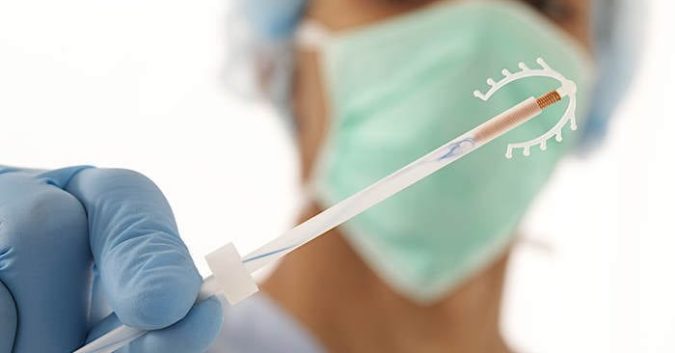Since November 2002, over 5,000 women have filed complaints with the Food and Drug Administration (FDA) over the implantable permanent birth control system, Essure®. Users of the system cited severe and life-altering side effects like miscarriages, stillbirths, excruciating pain, and bleeding. One such woman described the effects of Essure as similar to “[someone] taking your muscles or your insides and trying to pull them apart."
On Monday, the FDA finally responded to these complaints by mandating that German drug maker, Bayer AG provide a "black box warning" label with Essure. A “boxed”, or "black box" warning, is the FDA’s most restrictive label and one that lets users know if a product has potentially lethal or debilitating side effects – both of which are true for Essure.
The FDA issued a draft guidance with its call for a new warning label. The draft guidance will allow the public, including former victims, to have input into the language used on the warning. In addition to the label change, the FDA required Bayer to conduct a "surveillance study" to investigate "the risks of the device in a real-world environment." Specifically, the new tests will compare the risks of Essure against those of tubal ligation – a surgical procedure in which a woman’s fallopian tubes are severed and tied. Based on the results of these tests, the FDA will decide whether or not it needs to take stronger action.
What Exactly Is Essure?
The Essure birth control system involves non-surgically implanting nickel-titanium alloy coils into the fallopian tubes. These coils irritate the tissue of the fallopian tubes and cause scar tissue to build up over a period of 3 months. The tissue then permanently prevents sperm from reaching the eggs.
Some of Essure's side effects are caused by the coils producing a strong allergic reaction in certain women. Over 750,000 women worldwide use Essure, but more than 70 percent are in the United States. Due to the product’s widespread use, as well as its potential to cause severe side effects, the FDA is also issuing a checklist for doctors to consult when advising patients on whether or not they should use a system like Essure.
Warning Labels Are Not Enough
While the FDA is at least acknowledging the problems caused by Essure, many advocacy groups argue that a new label and more tests are simply not enough. "My hope was that they would recommend a recall," former FDA contractor Madris Tomes told CNN. Tomes found that, at the very least, Essure has caused or been involved in 303 fetal deaths. Tomes believes that 303 is a conservative number based on the limited data available, and that the true number is potentially much higher. "I feel as if the FDA truly failed these women," Tomes said.
Known as "E-Sisters" the network of women severely harmed by Essure has steadily grown since the early 2000s. While more than 5,000 women have filed complaints, Rep. Mike Fitzpatrick (R-PA) thinks that the number of women who’ve been hurt is much higher: "Tens of thousands of injured women and hundreds of fetal deaths," he told CNN.
With this in mind, it's far from certain that stronger warnings and more tests will solve the problem. Essure's existing clinical trials are already mired in controversy. There's strong evidence to suggest that the original manufacturers of Essure committed deliberate fraud during clinical trials to get the device on the market in the first place. Understandably, victims are wary of any more clinical trials conducted by the very company that makes the product in question.
What to Do if You Were Hurt by Essure
If you or a loved one have used Essure and experienced painful or severe side effects, make sure to explore your legal options. Sokolove Law offers a free, confidential consultation that could prove invaluable to you and your family.
